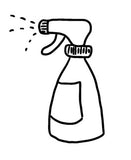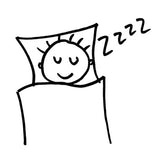The Bedwetting Doctor's Tips & Advice Blog
When to stop wearing nappies at night
Even if your child has good bladder control in the daytime, it can be unclear when to tackle their night time wetting. Wearing nappies or pull ups for as long as possible can seem the best option, but when should your child stop wearing nappies to bed at night?

The impact of bedwetting on mental health
Bedwetting can have a significant impact on a child's mental health. Sadly, as many as 1 in 6 children have a diagnosable mental health problem.

What should I say to someone who is bedwetting?
It’s important to remember how powerful your words can be. What may seem like just a small comment can have a big impact on someone who is affected by bedwetting. Here are some suggestions for how you can provide encouragement and support to someone who is struggling with bedwetting.

Bedwetting during the coronavirus pandemic
We are now in our third lockdown since the start of the coronavirus pandemic. This unusual time has been an intense period of stress and disruption to children, which has unfortunately led to an increase in both daytime toileting accidents and night-time bedwetting in children.

5 tips for managing wet nights
Bedwetting can be stressful for the whole family. Not only is there concern over the wetting itself, but increased laundry loads and tiredness can become a burden. Here are some tips to make wet nights that bit easier…

Should I be worried that my child still wets the bed?
It’s normal to feel worried if your child wets the bed regularly. The topic of bedwetting is often not discussed publicly, which can lead to feelings of shame and concerns that there is something “wrong” with your child. This, in turn, can increase your child’s anxiety over their wetting, creating a negative cycle....

How to support your child on their way to dry nights
Every parent wants the best for their child, so it can be difficult to watch your child suffer with bedwetting...

When should I stop using the bedwetting alarm?
All children take a different length of time to respond to the bedwetting alarm treatment. Some children see results after activating the alarm just a handful of times, whilst others may take a few months to learn to control their bladder overnight.

Daytime and Night-Time Wetting
Night-time bedwetting (nocturnal enuresis) can occur with or without daytime wetting (diurnal enuresis). The processes and treatment involved in these two types of wetting can differ.

Are you ready for school?
It’s nearly September, which can only mean one thing… back to school! Don’t panic if the summer whizzed by and all those plans to improve your child’s toileting habits or stop their bedwetting over the holidays never happened. We’re here to help!

Minimising the impact of bedwetting
Here’s some of our key advice for how to take control of the situation and minimise the impact that bedwetting has on you and your family...

3 Ways To Succeed With A Bedwetting Alarm
Alarms are the most successful long-term cure for bedwetting. To ensure success with the bedwetting alarm, these are some of our top tips...

Fluid Intake: DOs and DON’Ts
Confused about fluid intake? Here we share some simple DOs and DON'Ts for making sure you are following the right steps on the way to dry nights

Encouraging your child to wear a bedwetting alarm
Alarm treatment is recommended for children aged 5 if they want to become dry. If they seem disinterested at this age, it may be better to wait a little while until they feel ready to become dry. Once a child reaches the age of 7, if they are not regularly achieving dry nights then guidelines state that they should certainly participate in bedwetting treatment...

At what age should my child be dry at night?
By the age of 4, most children have learnt how to control their bladder during the day, but night time dryness usually takes a little longer to achieve...

Common mistakes in the process of curing bedwetting
Bedwetting can not only be upsetting for a child, but it is also often frustrating for a parent. However, it is important to treat bedwetting properly - these are some of the most common mistakes that we see parents make in their attempt to cure bedwetting.

Do children wake up to standard alarm sounds?
Recent research has shown that 80% of children sleep right through typical loud smoke alarms. What does this mean for bedwetting alarms?

Bedwetting Q&A
We're starting a new Bedwetting Q&A series on this blog. If you have a question about bedwetting that you'd like answered, let us know!

How to ensure long-term success with a bedwetting alarm
Bedwetting alarms have consistently been shown to be the best treatment for achieving a long term cure for bedwetting, with the majority of children who use alarm becoming permanently dry. We recommend taking a further step in the bedwetting alarm treatment to ensure long-term dryness...

Why we recommend not wearing pull-ups when using a bedwetting alarm
You may have noticed us mention that we don’t recommend wearing pull-ups during the bedwetting alarm treatment. Why?…

Keeping a good progress chart
Keeping a progress chart is a key part of the process of becoming dry at night with a bedwetting alarm. Here’s The Bedwetting Doctor’s tips for keeping a good progress chart so that you can maximise its benefits.

My child is a deep sleeper
Parents are often concerned that their child cannot be cured of their bedwetting because they are a deep sleeper. This is not the case – with the use of the right alarm and by following The Bedwetting Doctor’s top tips, deep sleepers can become dry at night in the same way as any other child...

What should my child drink?
If your child is using a bedwetting alarm, they should continue to drink lots of fluids to keep their bladder strong and encourage them to go to the toilet regularly in the daytime. But what should they actually be drinking?

How to stay motivated on the way to becoming dry at night
Here are some of our top tips for staying motivated during the bedwetting alarm treatment, because persisting will give your child the best chance of becoming permanently dry at night…

- Page 1 of 2
- Next
